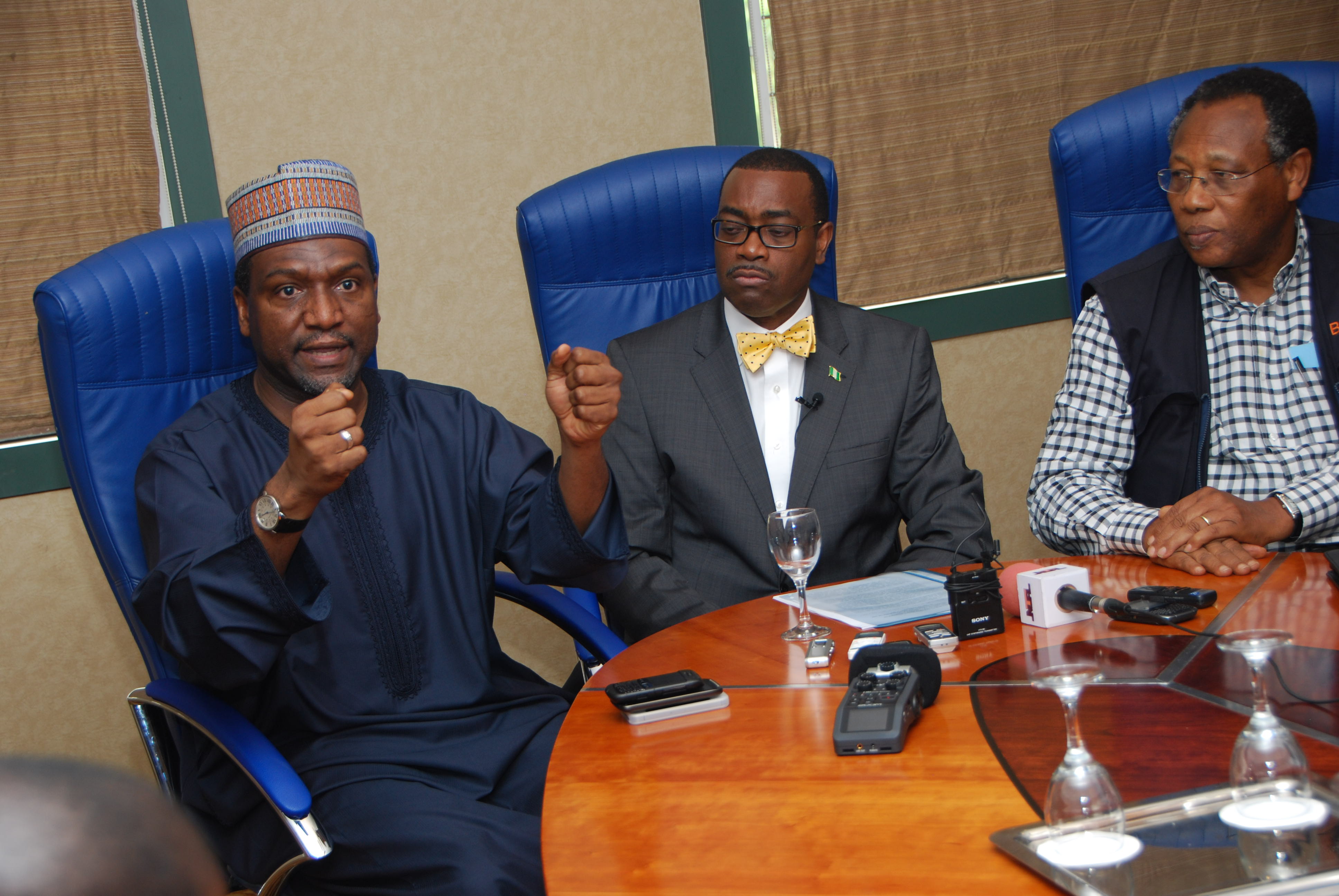



L to R (Pix 1 – 5) – Group Vice President, Dangote Industries Limited, Sani Dangote, Minister of Agriculture and Rural Development, Dr. Akin Adesina, CEO, Best Foods, Mr. Emmanuel Ijewere, at the Nigerian Agribusiness Group executive leadership meeting in Abuja on Monday
Nigeria’s Minister of Agriculture and Rural Development, Dr. Akinwumi Adesina, has launched the executive leadership of the Nigerian Agribusiness Group. The event held at the Transcorp Hilton Hotel, Abuja was for small, medium and large scale investors in agriculture, agro processing, marketing and input/machinery supplies from across the country.
In his address at the launch, the Minister noted that the launch of the Agricultural Transformation Agenda in 2011, signaled the enunciation of a clear vision which heralded the departure from the era of paying lip service to agriculture to one of doing agriculture as a government-aided but private sector-led sector. The change in Government vision for agriculture, focus and policy, Adesina said, was informed by its conviction that the private sector is the engine of growth in any forward-looking economy.
He said a first step towards realizing the target of adding 20 million metric tons of food to the national output set under ATA in 2011, was to end decades of corruption in input/seed supply and allocation, where government-procuredfertilizers and other vital inputs ended in private hands, with only about 11% of intended farmers accessing them. The result, he said, was a steady decline in agricultural productivity and increased impoverishment of farming families and communities.
To end this travesty, Adesina said, government introduced the electronic (e-wallet) system of allocating Government-subvented seeds and fertilizers directly to farmers and loosening the stranglehold of corrupt middlemen on farmers. To develop a databank vital to running the system efficiently, 10.4 million farmers across the country were registered and allocated registration cards under the Ministry’s Growth Enhancement Scheme (GES) which enable them access inputs through information sent through text messages to their mobile phones. Equally, input subvention by Government enabled access by 10.4 million farmers to products as well as enhanced food security for 30 million farm household.
In the 2012/2013 farming season, seeds and fertilizers were procured at 100% and 50% subsidy respectively and sold through private seed companies, which retrieveGovernment’s counterpart funding from the designated Government account.
Adesina further informed that local fertilizer manufacturing and blending capacity has significantly expanded, with US$5 billion in new investments. In the two years of ATA, the number of seed companies doing business in Nigeria has grown from 11 to 77. Dr. Adesina also said the agribusiness investors that Government has received over US$4 billion in executed Letters of Intent (LOIs) in investment by 30 private sector agribusinesses, while it has established relationship with over 150 agribusinesses in Nigeria.
During the course of engaging these businesses, Government identified a number of challenges in 2013. It therefore commissioned a study to weight the challenges with a view to designing strategies to address them. The study showed that 72% of agribusinessessampled identified poor/lack of infrastructure as a major disincentive to agribusiness in the country; financing (56%); supply security—assurance of getting feedstock in the right quantity, quality and price— (55%); sustainability/predictability of Government regulations, tax and policies (53%). Other concerns identified in the study were poor quality of human capital (45%), security of lives and property (39%), land (24%) and Government co-ordination (19%).
The Minister stated that based on this evidence-based data, his Ministry was already addressing the top four concerns head-on through the development of the Staple Crops Processing Zones (SCPZ), which are expected to add an additional N1.4 trillion to the national Gross Domestic Product (GDP). A number of multinational investors are bringing in various sums in investment in agricultural produce processing. An SCPZ was launched late January 2014 in Alape, Kogi State, with 5 others to be commissioned in Niger, Kano, Enugu/Anambra, Lagos and Rivers State in the year.
Difficulty in accessing land is being addressed in partnership with State and Local Governments. The Ministry and the German Development Bank (KFW) and the Federal Ministry of Finance have also established a Fund for Agricultural Financing (FAFIN), a private equity and quasi-equity and debt fund, which will deploy $100 million in long-term finance to agribusiness. FAFIN provide financing of between $2 and $5 million to qualifying agribusinesses.
Dr. Adesina expressed his confidence that with the leadership of the Nigerian Agribusiness Group, the nation’s food billion which dropped from N2.3 trillion to N1.8 trillion between 2011 and 2013 will drop even further, as Nigeria continues to encourage local production, processing and value addition in the industry, with the ultimate goal of making Nigeria a net exporter of food and food products.
Alhaji Sani Dangote, President of Dansa Foods, who is the Protem President of the Nigeria Agribusiness Group, thanked the Minister and President Jonathan for the clear-cut vision and interest in developing the agricultural and agribusiness sectors in Nigeria, adding that a measure such as the ATA is unprecedented in Nigeria. He also said Nigerian investors in agriculture, food processing, input marketing, equipment manufacturers’ representatives and vendors, among others came together to present a common front in interfacing with government to create jobs and wealth for Nigerians through agriculture.
According to him, the group arose out of the need on the part of investors in the agricultural sector to have a strong platform for articulating a purpose-driven vision for the sector, as well as partner with Government to make farming and allied industry more attractive, secure and profitable, with a view to achieving the goals set in the Federal Government’s Agricultural Transformation Agenda (ATA).
Dangote said the group has seen demonstrable purposefulness in the current Government leadership in agricultural sector, and is willing to work with the administration to promote the interest of Nigerians.










